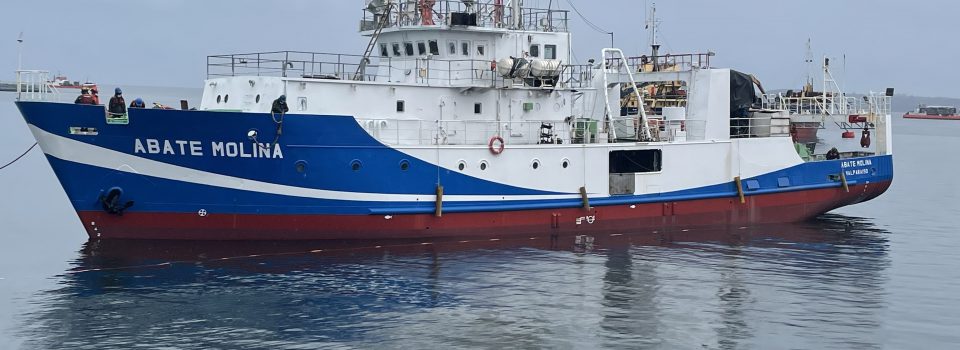On April 13th, remodeled scientific vessel Abate Molina arrives in Valparaíso
December 13th, 2022After six months of shipyard work in Puerto Montt, the scientific vessel Abate Molina returns completely renewed. The ship, which for more than 32 years has been fisheries research emblem in Chile, underwent a profound modernization of its systems and accommodations.
Abate Molina scientific vessel is operated by Fisheries Development Institute (IFOP) and carries out seven annual fishing and oceanographic research cruises between Arica and Chacao channel, involving up to 240 days of navigation.
Luis Parot, IFOP executive director, expresses the institute’s great satisfaction for this initiative successful completion, although he anticipates that modernization of the engine and other equipment is still required to meet the standard of an international scientific vessel in terms of emissions.
—So, what is expected for the future?
—The first thing is to thank transversal support we received by allocating resources and carrying out this remodeling. Thanks to the efforts of many, especially our Marine Operations personnel, we finished it successfully, but the change of the engine and some equipment that we are evaluating is still pending.
—For a long time there has been a request for a new scientific ship, to replace Abate…
—Strictly speaking, it is not a question of decommissioning Abate Molina, but rather having another modern vessel, with new capabilities, and one that can operate without Abateś restrictions. We must do some scientific cruises in leased vessels that operate in the same fishery, which is not recommended, because IFOP must jealously guard its independence and the trust of all actors.
“That is to say, will Abate remain operational?”
“We hope so.” There is a growing demand for environmental, ecosystem, and climate issues knowledge, and this requires research and scientific ships available at an affordable cost, conditions that Abate fulfills very well. The ship can continue executing cruises from Valparaíso to the north and the rest of the time it would have available, execute cruises for universities and other centers interested in researching the ocean and its resources. There’s a debt there that we can help pay off. Investing in the Abate continues to be very good for research and for Chile.
—But, what is the new ship’s project ?
—2022 Budget Law assigned IFOP the task of executing this project in its initial stage and we are making progress: we have already defined requirements, on May 15th we will raise international tender for design and construction, and on August 15th the bids will be received.. With them in hand and once evaluated, they will be presented to the Ministry of Economy and the Budget Directorate so that we can be authorized to award the construction. In any case, we will take the protection of being able to do so until January 15th, 2023.
“What kind of ship are you looking for?”
—Essentially, a modern scientific vessel for fishing and oceanographic research, with state-of-the-art equipment, that facilitates science on board, that can navigate properly along the entire coast to Magallanes, and with a low operating cost. If all goes well, she should be active in the first half of 2025.
“What is the useful life left to Abate?”
—Abate Molina is reconditioned. However, modernization of engines and other equipment is required to meet an international scientific standard for vessel emissions.
The Abate has a conventional diesel engine that, although in good condition, does not meet noise standard (euro 309), and some equipment such as fishing winches and electrical and electronic boards need to be replaced by modern equipment that takes up much less space. and require fewer repairs and less maintenance.
“What, then, is the ship’s diagnosis ?”
—The Abate is the same as an old car that is kept in very good condition, and can continue to operate for a while longer. Now, like an old car, it is somewhat obsolete if we consider the requirements of current fisheries and oceanographic research, and the demand for more and more complete research to understand the impacts of climate change on fishery resources and ecosystems.
